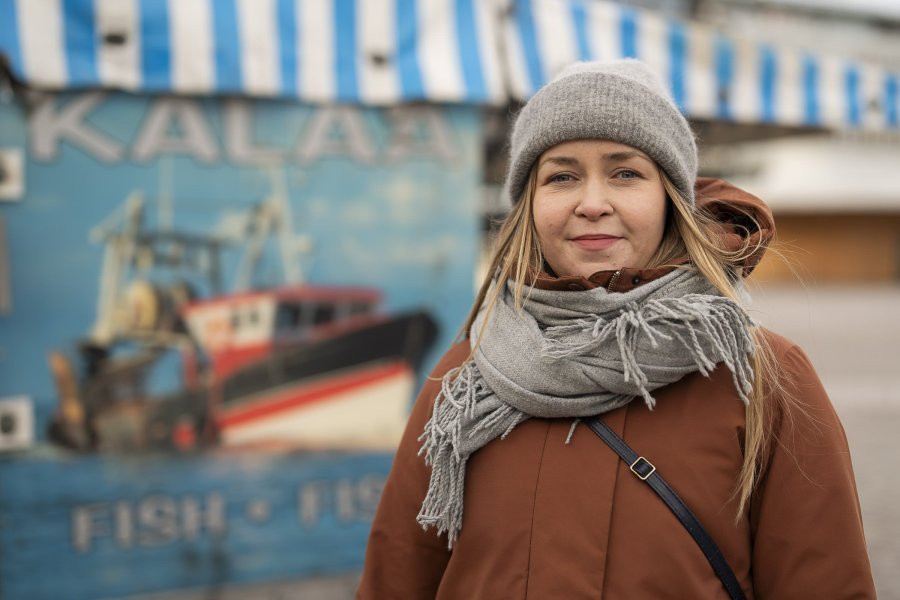‘My path to research began on the island of Seili’
In the summer of 2011, biology student Katja Mäkinen could not have imagined that her first internship in the field, at the Archipelago Research Institute of the University of Turku, would alter her dreams of becoming a teacher. However, that’s exactly what happened, and that field work on Seili sparked her interest in research work and led her to a career as a researcher.Published 7.2.2024
Text: Leena Hulsi / Viestintätoimisto Jokiranta Oy
Images: Niko Sieppi
Nature has always been part of Katja Mäkinen’s life. Mäkinen is originally from Porvoo, in Southern Finland, and spent her childhood by the sea. The maritime environment and the interesting tales and photos shared by her father, who worked on a cargo ship, inspired a deep interest in the sea and marine nature.
‘The sea has been important to me ever since I was little – as have the forests. I spent a great deal of time in the forest with my family, and a strong relationship with nature is a bonding force for our family. An appreciation for nature is in my genes’, Mäkinen says.
In upper secondary school, Mäkinen’s favourite subject was Biology, and so it seemed like a good future plan for this intellectual and socially active young woman to continue on to study biology and geography at university.
‘At that time, nature conservation and environmental issues were highly topical, and the desire to have an impact on these issues was great. I applied and was accepted to study Biology at the University of Turku, and my original aim was to graduate as a subject teacher of Biology and Geography. I had already completed my pedagogical courses for teachers, but my summer position on Seili changed my plans’, recalls Mäkinen.
‘I was accepted as a university intern on Seili for the summer of 2011, and that’s the path I stayed on. In 2013, I was chosen for the position of a fixed-term preparator on Seili, and the position was later made permanent. Since that time, I have studied, conducted research and worked on Seili.
Mäkinen wrote her Master’s thesis work on time series datasets concerning zooplankton collected at Seili. The time series datasets compiled by the Archipelago Research Institute are unique worldwide because of the duration of time their cover.
‘My doctoral dissertation in 2019 also dealt with the same area of study. In my dissertation, I continued and expanded on the analysis of long-term changes in zooplankton’, Mäkinen explains.

‘The small, grey, schooling Baltic Herring makes an interesting research subject. It is a migratory and complex species that serves as an indicator of many types of changes in the sea’, states Senior Researcher Katja Mäkinen.

‘There are small auditory ossicles, or otoliths, below the brain of the Baltic Herring, and they help to determine, for example, the age of the fish. They are a sort of black box that contains a lot of valuable information about the growth and migratory routes of the fish’, explains Katja Mäkinen. Image: Vastavalo
Endless thirst for knowledge
Mäkinen’s enthusiasm for research work did not wane after she graduated with her doctorate – quite the opposite, in fact.
‘The accumulation of information feeds the desire to research even further. It is often the case that just when you think you are solving something, another factor enters the picture and changes everything, thereby forcing you to consider things in a whole new light. It is tremendously rewarding when the missing pieces drop into place and you start to visualise the whole’, says Mäkinen.
Mäkinen is happy that she has had the opportunity to continue her researcher work and to work for three years as a postdoctoral researcher on grant funding provided by the Sakari Alhopuro Foundation.
‘Funding from foundations plays an extremely vital role in science. Foundation funding decisions are often made by experienced experts in the field who have an understanding about, among other things, the type of research necessary to supplement existing research data. Funding is also needed for basic research, not just for innovations’, Mäkinen emphasises.
‘The information generated by dissertation research is often forgotten and, thus, wasted if the researcher doesn’t receive further funding. Perseverance is also important when it comes to funding, since it can often take a researcher a couple of years before they are able to properly initiate their work.’
Currently, Mäkinen is working as a Senior Researcher at the University of Turku as well as teaching new students. Some of them are likely aiming for a career in research, so what attributes does Mäkinen believe it requires from them?
‘The most important attribute is the right attitude and a thirst for knowledge. Endless curiosity, the desire to clarify issues and perseverance to see a project to completion. You have to be willing to work hard, write grant applications and, also, withstand disappointments. Practical skills and methods can always be learned, but drive and enthusiasm have to be inborn and genuine’, Mäkinen adds.

'In Finland, the most important species for the fishing industry is herring', says Katja Mäkinen.
Meaningful work
Mäkinen considers the possibility to discover things and produce useful data as the best aspects of a researcher’s job.
‘A researcher’s freedom is motivating. In this work, you are constantly developing yourself, networking with fascinating people and participating in international collaboration. Researchers can largely determine themselves what they want to research and what methods they will use.
‘Researchers can truly feel that their work is meaningful - you have the opportunity to make a difference and generate new information that will be beneficial to society and the world. That list could be further expanded by adding good colleagues, the enthusiasm of students and the dopamine rush brought on by breakthroughs and success’, Mäkinen adds with a laugh.
Read more about the herring research at the University of Turku
